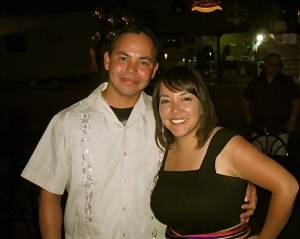I was watching an “Ace of Cakes” marathon on the Food Network the other day. In case you haven’t seen the show, Charm City Cakes is a bakery in Baltimore where artist-bakers design these amazing cakes in 3D form, like airplanes and those giant balloons that rich kids like to bounce in at their birthday parties. Very cool stuff—the cakes, not the bouncing, although that might be fun.
They aired the one where they make a cake for a zoo event in the shape of a standing elephant, complete with wrinkly skin. Then, as if it couldn’t get any better, they made one of an old school NYC subway train—those metallic rounded cars, complete with full-on, 6-foot tall graffiti. These cakes seem totally extravagant and expensive and it makes me wonder who the heck actually pays for such fancy cakes for events like a 5-year-old’s birthday party. But I really like watching them construct the sculptures and paint the designs.
**
Yesterday I spent over six hours at this great Chicano coffeeshop just writing—writing like the wind. It’s funny how a super-productive day can feel really good, even if you leave feeling like you’ll need a million more hours just to say what you need to say. And today I changed my primary focus of the chapter…again for the 4th time in 3 weeks. I guess that’s the nature of a dissertation. And hopefully it will be the better for it.
I only wonder when the stress will subside.
**
Just this weekend, I was talking with a grad school amiga about how often there are moments when I think, I could be so much happier doing something else—something other than academia. And yet, I keep on, despite the personal and political contradictions that plague my existence as an intellectual and as someone committed to the liberatory possibilities of community-building. She has similar experiences–that’s why she’s my girl.
My struggle lately—or perhaps all along—has been the issue of owning knowledge (which I wrote about here before). I am haunted by the constant need to demonstrate that I, as a historian, am “doing something new” even though one could argue that nothing really is “new” because all studies build on work and ideas that have come before theirs. (And by work and ideas, I mean the broadest senses in which we might think about theorizing knowledge-making and the labor needed to make that happen, inside or outside the boundaries of the academy.)
The haunting spirals into frustration when people who work outside my subfield (gender and Asian American history, for example) who find it necessary to tell me that my topic has “been done” by citing the three texts they’ve read about gender and the three they’ve read about Asian Am history. (Nevermind that I am looking at those subfields together along with other subfields too. And of course, there actually are scholars who have come before me who have looked at those subfields together. Gasp!) This is not the first time that’s happened–when well-meaning folks suggest that I need to “position” (read defend) myself against others who have studied similar themes so as to prove that my entire dissertation does not simply repeat their narratives–and it won’t be the last. Of course, there are expectations that one be clear about one’s interventions in “the field,” that one must write in conversation with key texts. That’s really important, especially for brown/women academics because we always seem to have to defend our existence in the academic world. My frustration arises from what happens along the fissure between asking how you understand your study in relation to a specific theory/argument/story, and the somewhat accusatory, implied question of whether you have read key books in your own field. Perhaps this is a question about colonialism, respect, community and pedagogy (something I learned a great deal about from my compañeras/os in tejas).
But this is not about those people—who actually are trying to help and who gave me some great feedback. It is about the culture of knowledge production in the academy/field that fundamentally reproduces false notions of objectivity despite all the work folks have done to show how knowledge-making is shaped by perspective, that it is socially constructed, colonialist and all that jazz—a culture that encourages people to be competitive and selfish. When it gets to that, it’s not about learning or sharing–it’s about showing off and one-upping everyone else. That’s why I left grad school back in 2000, thinking I would probably never return and hoping I would never be one of those scholars who forgot to learn.
I could go on and on.
**
My point here is that, even on the good days of writing or researching or teaching—the really exciting days—I still constantly consider stopping this academic thing and becoming an artist-baker-coffeeshop-bookstore-running person instead. I could make cinnamon rolls, pan dulce, bizcochitos, sopapillas, pozole and a really good tomato soup. I could stock books, magazines and artwork that tell our stories. Hopefully people I love, even if I don’t know them, would feel comfortable spending time there. That way, at least I could participate in the creation of a space in which community and learning comes first, rather than owning knowledge. And maybe then the idealist in me won’t be smudged away by cynicism and frustration.


